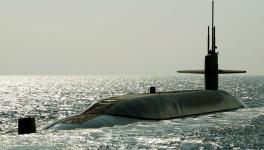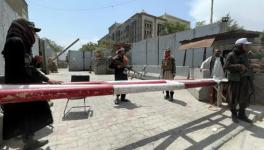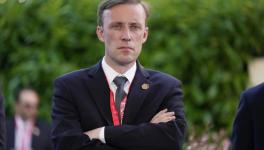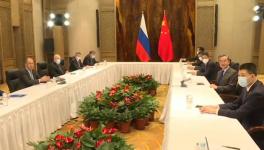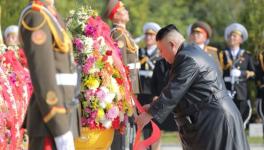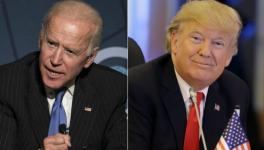World Order Looks Different From Moscow, Beijing
Chinese, Russian warships in joint drills, Sea of Japan, Oct 2021
The Chinese Defence Ministry announced on Wednesday its participation in the Vostok 2022 strategic command and staff exercise in Russia, which is slated for August 30-September 5. The low-key statement in Beijing said China will send some troops and the participation is within the framework of the two countries’ annual cooperation plan.
The statement mentioned that “India, Belarus, Tajikistan, Mongolia and other countries will also participate.” It said the Chinese participation “aims to deepen pragmatic and friendly cooperation with the militaries of the participating countries, enhance the level of strategic coordination among all participating parties, and enhance the ability to deal with various security threats.”
In what can be construed as an oblique reference to the conflict in Ukraine and the big power tensions in general, Beijing stated that the exercise is “unrelated to the current international and regional situation.”
Vostok is one of the capstone events of the Russian Armed Forces’ annual training cycle to test national preparedness for large-scale, high-intensity warfare against a technologically advanced peer adversary in a multidirectional, theatre-level conflict.
Vostok 2018 involved approximately 300,000 troops –- as well as 1,000 fixed-wing aircraft and helicopters, 80 ships, and 36,000 tanks, armoured and other vehicles — and was unprecedented in scale. And Russian,Chinese and Mongolian forces were the sole participants and was hyped up as a carefully orchestrated Russian-Chinese military demonstration.
It seems the Chinese participation will be scaled down, notwithstanding the gathering storms on the horizon for both Russia and China. The Chinese announcement comes a day after Russian President Vladimir Putin used exceptionally harsh language to condemn the “Western globalist elites,” accusing them of provoking chaos, “fanning long-standing and new conflicts and pursuing the so-called containment policy” in the pursuit of an agenda “to keep hold onto the hegemony and power that are slipping from their hands.” Putin alleged, “They need conflicts to retain their hegemony.”
The speech while addressing the 10th Moscow Conference on International Security in Moscow on Tuesday, also contained some pointed references to the Asia-Pacific region. Putin said:
“NATO is crawling east and building up its military infrastructure… US has recently made another deliberate attempt to fuel the flames and stir up trouble in the Asia-Pacific. The US escapade towards Taiwan is not just a voyage by an irresponsible politician, but part of the purpose-oriented and deliberate US strategy designed to destabilise the situation and sow chaos in the region and the world. It is a brazen demonstration of disrespect for other countries and their own international commitments. We regard this as a thoroughly planned provocation.
“They want to shift the blame for their own failures to other countries, namely Russia and China, which are defending their point of view and designing a sovereign development policy without submitting to the diktat of the supranational elites.
“We also see that the collective West is striving to expand its bloc-based system to the Asia-Pacific region, like it did with NATO in Europe. To this end, they are creating aggressive military-political unions such as AUKUS and others.”
Significantly, Putin called for “a radical strengthening of the contemporary system of a multipolar world.” He said, “All these challenges are global, and therefore it would be impossible to overcome them without combining the efforts and potentials of all states…
“Russia will actively and assertively participate in such coordinated joint efforts; together with its allies, partners and fellow thinkers, it will improve the existing mechanisms of of international security and create new ones, as well as consistently strengthen the national armed forces and other security structures by providing them with advanced weapons and military equipment. Russia will secure its national interests, as well as the protection of its allies.”
Notably, however, the Chinese commentaries generally steer clear of bracketing the Taiwan question and the conflict in Ukraine as analogous, as symptomatic of the birth throes of a multipolar world. In a commentary on Wednesday, the senior editor with People’s Daily, Ding Yang once again flagged that the real danger is that the US and China may “sleepwalk into conflict.”
He wrote that the US is “like a runaway horse running wildly to the precipice of war,” but the aim is how to profit from a war, or rather “how to profit from someone else’s war.” Ding took a Marxian perspective that the US policy is driven by the interests of US capital and “Washington sees China as an enemy because it has moved the US cheese.”
As he sees it, at its core the US strategy is “to squeeze China out of the global market and manufacturing chain.” Thus, even with regard to Taiwan, “One of the main aims is to create tensions and further pulling Taiwan Semiconductor Manufacturing Company into the US chip siege against China.”
Ideology, human rights, etc., are only alibis for the capital competition for markets. Plainly put, it unnerves the US that “Chinese capital is also starting to go global.”
Deng is confident that “If we follow the logic of capital development as they see it, what matters is that Chinese manufacturing will eventually push them out of the global industrial chain, leaving them with no money to make and no work to do. So the first thing they want to do is to maximise their share of the Chinese market.”
“Then the next thing to do is inevitably to implement a global stranglehold on Chinese capital and Chinese manufacturing.” This is where the danger lies, as “the option of war is an inherent part of US capital export and expansion.”
But China’s advantage is that “in contrast to the historical path of Western capital’s global expansion, there is a logic of “common development” behind Chinese capital going abroad.”
Interestingly, the government newspaper China Daily reported that China’s holdings of US Treasuries have been further reduced through July, but China is only one of many other countries doing so, including Japan, reacting to the Fed’s tightening cycle.
But “the decline may gradually decelerate.” The point is, it is “unrealistic” for China to give up on US debt holdings so long as the US Treasuries remain a critical international reserve asset! This is diametrically opposite the revisionist path Russia took.
MK Bhadrakumar is a former diplomat. He was India’s ambassador to Uzbekistan and Turkey. The views are personal.
Get the latest reports & analysis with people's perspective on Protests, movements & deep analytical videos, discussions of the current affairs in your Telegram app. Subscribe to NewsClick's Telegram channel & get Real-Time updates on stories, as they get published on our website.









